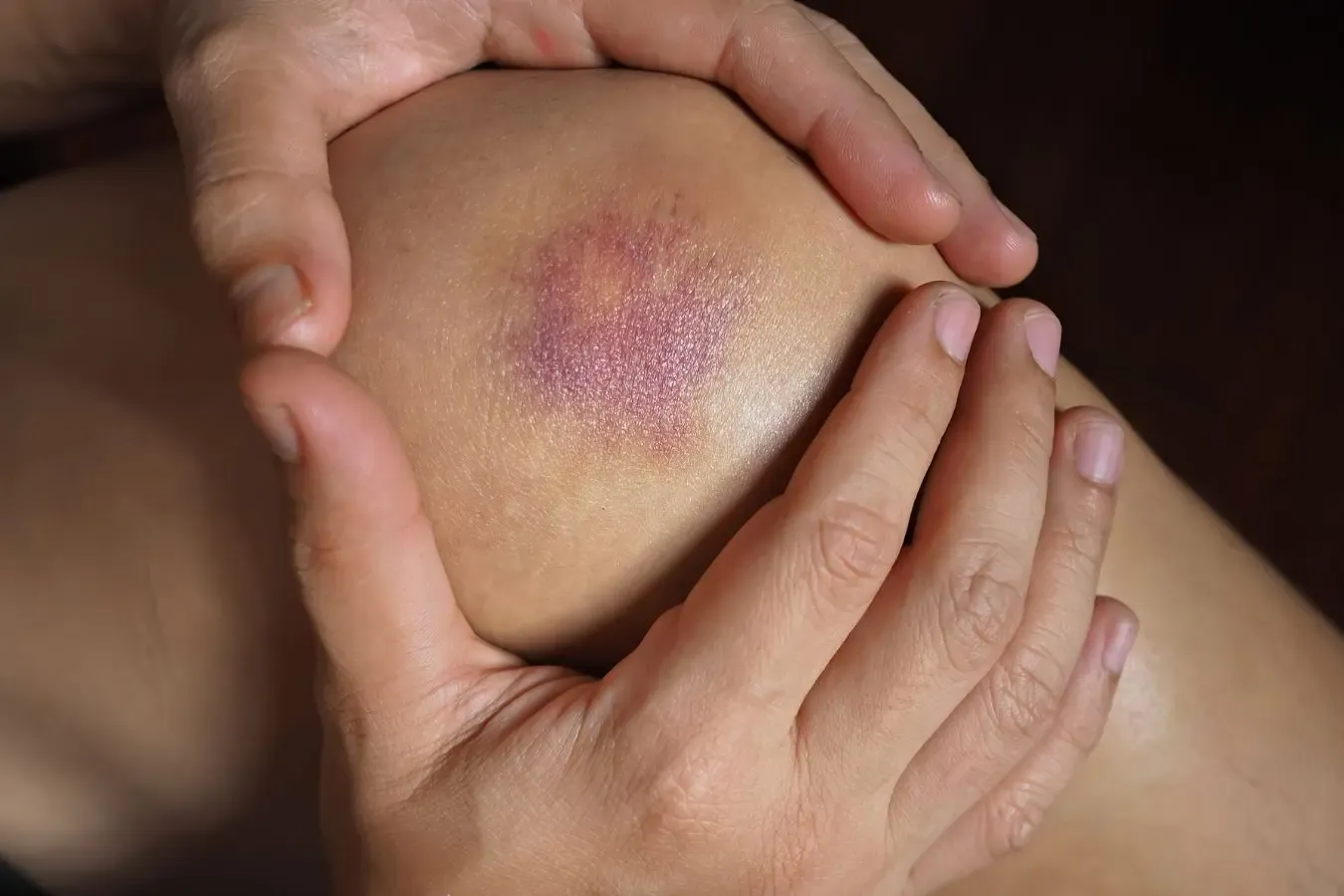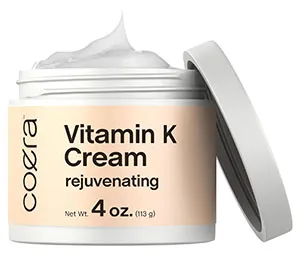Understanding how vitamin K for bruising works can help you fade discoloration faster while supporting healthier skin. As one of the most effective natural remedies, vitamin K helps reduce bruising and speed healing after injuries or cosmetic treatments.
TL;DR — Vitamin K for Bruising Relief
| Aspect | Summary |
|---|---|
| Reduces Bruising | Promotes faster clot formation and minimizes discoloration |
| Strengthens Blood Vessels | Supports collagen and vascular protein synthesis |
| Improves Skin Tone | Helps reduce redness, spider veins, and under-eye circles |
| Speeds Healing | Assists damaged tissue recovery after injuries or procedures |
| Evidence | The effects of topical vitamin K on bruising after laser treatment |
| Recommended Product | Coera Vitamin K Cream |
Benefits of Vitamin K for Bruising
Bruising is a common occurrence resulting from the rupture of blood vessels beneath the skin’s surface, often caused by injury or trauma. Vitamin K has been shown to play a significant role in reducing the severity and duration of bruises by promoting efficient blood coagulation. One notable study examined the effects of topical Vitamin K on bruising after laser treatment. Participants who applied Vitamin K cream experienced reduced bruising compared to those who didn’t.
Moreover, clinical studies have demonstrated that Vitamin K supplementation can improve bruising outcomes, particularly in individuals with certain medical conditions that affect blood clotting, such as liver disease or those taking anticoagulant medications. By enhancing the body’s ability to form blood clots, Vitamin K can help minimize the extent of bruising and accelerate the healing process.
Additional Skin Benefits of Vitamin K
Beyond bruising relief, Vitamin K contributes to:
- Capillary Strength: Reinforces vessel walls, reducing broken capillaries and spider veins.
- Elasticity & Repair: Assists in collagen production for firmer, more resilient skin.
- Under-Eye Circles: Helps fade discoloration caused by leaky capillaries beneath thin skin.
This makes Vitamin K creams a favorite in dermatology for post-injection recovery, varicose vein care, and brightening the delicate eye area.
Mechanism of Action
Vitamin K plays a crucial role in the blood coagulation process by activating proteins known as clotting factors, which are essential for reducing bruising and blood loss. When a blood vessel is injured, these clotting factors become activated and work together to form a blood clot, which stops the bleeding and allows the injured tissue to heal. Vitamin K activates explicitly clotting factors II, VII, IX, and X, which are essential for the formation of stable blood clots. By promoting efficient blood coagulation, Vitamin K helps to minimize the severity and duration of bruises, allowing them to heal more quickly.
In addition to its role in blood clotting, Vitamin K for buising also contributes to skin health by supporting the production of proteins involved in maintaining the integrity of blood vessels and connective tissue. This may help to strengthen the walls of blood vessels, reducing their susceptibility to injury and leakage, and promoting overall skin health and resilience.
Dosage & Use
- Oral intake: 90–120 µg daily (from diet or supplements)
- Topical use: Apply Vitamin K cream 1–2 times daily to affected areas.
Rich dietary sources include spinach, kale, broccoli, and natto.
NOTE: If you take anticoagulant medications (like warfarin), consult your physician before increasing Vitamin K intake.
Recommended Vitamin K Creams
| Product | Best For | Highlights | Amazon |
|---|---|---|---|
| Coera Vitamin K Cream (4 oz) | Bruises, spider veins, under-eye circles | Paraben-free, SLS-free, smooth absorption | |
| Skintensive Bruise Cream with Arnica + Vitamin K | Post-procedure recovery, sensitive skin | Combines Arnica + Vitamin K for faster healing and reduced discoloration | |
| Piping Rock Vitamin K Cream (4 oz) | Everyday use / value-conscious shoppers | Large jar size, smooth texture, ideal for general skin repair and bruise care |
FAQ
Can Vitamin K really help bruises heal faster?
Yes. Vitamin K activates proteins involved in blood clotting, helping seal small capillary leaks that cause bruises. Clinical studies have shown that topical Vitamin K creams can reduce bruise severity and accelerate recovery after injuries or cosmetic treatments.
Is it better to take Vitamin K orally or apply it topically?
Both forms can be effective. Oral Vitamin K supports internal clotting and vascular health, while topical creams target localized areas—ideal for use on bruises, under-eye circles, or during post-procedure recovery.
How long does it take for Vitamin K to heal bruises?
Most people notice visible improvement within 2–3 days of consistent topical use. Full results may appear after 7–10 days, depending on the depth of the bruise and the individual’s skin type.
Are Vitamin K creams safe for sensitive skin?
Generally, yes. Look for formulas labeled paraben-free and SLS-free. Always patch test first, especially if you have reactive or post-procedure skin.
Can I use Vitamin K if I’m on blood-thinning medication?
Consult your healthcare provider first. Vitamin K affects blood clotting and may interact with anticoagulants such as warfarin. Never adjust your intake without consulting a medical professional.
Related Reading
- Natural Ways to Lower A1C
- The Benefits of Omega-3 Oil: Understanding DHA and EPA
- Plant Sterols for Cholesterol and Vascular Health
Conclusion
In conclusion, Vitamin K offers a natural solution to minimize the severity and duration of bruises while supporting overall skin health. By promoting efficient blood coagulation and strengthening blood vessel integrity, Vitamin K can accelerate healing and contribute to healthier, more resilient skin. Incorporating Vitamin K-rich foods or supplements into your diet may be beneficial for individuals prone to bruising or seeking to improve skin health. However, it’s essential to consult with a healthcare professional before starting any new supplement regimen, especially if you have underlying medical conditions or are taking medications that may interact with Vitamin K.
Reference: The effects of topical vitamin K on bruising after laser treatment https://pubmed.ncbi.nlm.nih.gov/12140470/
Affiliate Disclosure
This website contains affiliate links, which means that if you click on a link and make a purchase, we may receive a small commission at no additional cost to you. These commissions help support the content we create and maintain. We only recommend products and services we believe add genuine value to our readers.
Medical Disclaimer
The information provided on this website is for informational and entertainment purposes only and is not intended as medical advice. The content is not reviewed or approved by the Food and Drug Administration (FDA) and should not be used to diagnose, treat, cure, or prevent any disease. Always consult with a qualified healthcare professional before making changes to your diet, supplement routine, or lifestyle.


